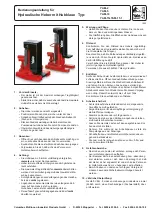
WARRANTY
This jack is covered by a 12-month warranty starting from the date the warranty comes into effect or from the date the
jack leaves our factory if it has not already been rendered effective on-line; it covers all manufacturing defects but not
transport expenses, defects caused by improper use or damages suffered during transport. For more details please see
the card attached to this manual.
MAINTENANCE JOBS FOR THE END USER
- To ensure your jack a long life it is advisable to clean the pistons externally once a fortnight.
- Check the level of oil in the tank at least twice a year: this must be done with the pistons completely lowered. The oil
level must be up to the small bolt that is on the side of the tank. If you have to top up the oil in the tank make certain the
oil you are using is compatible with what is already inside the tank so as not to compromise machine integrity.
DWG.
14
- If the oil level is higher than it should be, even by only a little, or if the jack has been turned upside down (as can easily
happen during transport), the oil is expelled through the suction pump as mist. This phenomenon disappears on Its own
when the oil level hase been restored. If the oil inside the tank exceeds the level by a lot, it is advisable to remove some
until it is back in the norm.
AIR BLEEDING
Each time the jack is serviced, removing and refitting parts connected to the tank and motorpump, it is advisable to bleed
off all air. There are 2 bleeding types for this jack.
Bleeding phases type 1:
1. The piston must be moved out completely.
2. Loosen
(NEVER unscrew the dowel completely!)
dowel no. 2534 which is in the hou- sing of the extension
on the plate, and let all the air out from the dowel, continuing until oil starts coming out and then close the dowel.
DWG. 15
3. Move the piston back in completely and check the oil level.
4. Try to operate the jack without any load and if the piston lowers in jerks repeat the procedure at least 2 or 3 times.
Bleeding phases type 2:
1. The piston must be moved out completely.
2. Turn the jack over on the piston, levering with the handle as illustrated in the figure.
DWG. 16
3. Start the lowering function until the piston moves back in properly.
4. Put the jack back into the working position.
5. Move the piston back in completely and check the oil level.
6. Try to operate the jack without any load and if the piston lowers in jerks repeat the procedure at least 2 or 3 times.
MAINTENANCE RESERVED TO A PROFESSIONALLY QUALIFIED
ENGINEER
Having to carry out maintenance or overhauling, use exclusively genuine spare parts to ensure the utmost reliability for
the jack.
PROBLEMS
Solutions
EN
16
Summary of Contents for YAK 135
Page 1: ...YAK 135 Ultima revisione 09 2010...
Page 3: ...YAK 135 I 3...
Page 10: ...I 10...
Page 12: ...YAK 135 EN 12...
Page 19: ...EN 19...
Page 21: ...YAK 135 DE 21...
Page 28: ...DE 28...
Page 30: ...YAK 135 FR 30...
Page 37: ...FR 37...
Page 39: ...YAK 135 Es 39...
Page 46: ...Es 46...
Page 47: ...47...
Page 48: ...48...
Page 50: ...50...
Page 51: ...51...
Page 52: ...52...
Page 53: ...53...
Page 54: ...54...
Page 55: ...55...
Page 56: ...56...
Page 57: ...57...
Page 58: ...58...
Page 59: ......
Page 60: ......
















































